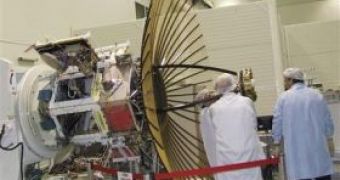The launch that took place from the Sriharikota space station, at 03:45 GMT, was carried by the Indian authorities in the greatest secrecy, as the vehicle carrying the satellite has not been publicly announced or scheduled for launch. This represents the second successful launch of a foreign satellite by the Indian Space Research Organisation, after the launch of the Italian satellite back in April last year. India has as priority to join the race of commercial satellite launching, along with the other large space agencies offering such services.
India has started its space program back in 1963 and, since then, has been successful in placing its own satellites into orbit, and it developed launch vehicles in order to disable to dependency on all other space agencies. Its first satellite into the Earth's orbit has been launched in 1980 with the help of a rocket of Italian design and weighed about 35 kilograms.
Israel commissioned the launch that took place today about three years ago, since it did not have orbital polar flight capabilities. Tecsar or Polaris represents a spy satellite which will be used to photograph Iran facilities, currently considered Israel's biggest threat. The Bangalore ISRO base officials refused to talk about the failure to make public the fact that they would launch a polar satellite today, which could be associated with the geopolitical problems in the middle east.
Tecsar represents the most advanced Israeli satellite ever launched and is equipped with a camera capable of taking pictures of Iranian soil through thick masses of clouds, in day or night conditions. The 300 kilograms Polaris will keep an eye on the Iranian nuclear program which is thought to be devising nuclear weapon capabilities, though some U.S. secret agencies suggested that Iran might have put an end to its nuclear program more than three years ago.
Israel is backed by the U.S. help in its efforts to intensify sanctions against Iran, until they would stop their nuclear program. On the other hand, Iran states that the research it is making in this field is related to power generation only and has no intentions in developing nuclear weapons. Israel currently operates a number of other satellites into Earth's orbit, two surveillance satellites Ofek 5 and 7 and several commercial ones from the series Amos and EROS.

 14 DAY TRIAL //
14 DAY TRIAL //